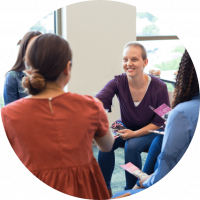
Support coordinator to hub leader
It is important to have regular contact with your hub leaders, as you are a vital source of information for relevant services and referrals. One-on-one meetings are on an ‘as needed’ basis. You will meet with new hub leaders regularly but this will reduce with time as the hub leader becomes more experienced and familiar with running the hub. These will be replaced by regular meetings facilitated by you for all hub leaders in your network, so that they can connect and learn from one another.

Support coordinator to principal
Support coordinators ideally meet once a term with each principal to discuss hub planning, activity and achievements, and to review impacts using the NCHP Quality Framework tool. You will also schedule quarterly principals’ meetings focusing on sharing, networking and leveraging opportunities, as well as resolving challenges encountered by hubs.

Support coordinator with key local organisations
Support agencies connect with and bring together local leadership groups including (but not limited to) local government, key local partners, representatives of regional education offices and school principal representation. This also helps you support hubs in accessing local support services delivered through the hub.
Providing guidance to hub leaders and schools
Employing an integrated ‘Whole of School’ model
This involves building strong connections between the school and the hub, ensuring that both are equally invested in the success of the hub.
You can assist hub leaders by encouraging them to establish strong connections and collaboration between the school and the hub; to make connections between their school plan and the community hub outcomes and program planning; and to ensure there is collaboration between the school and hub throughout the cycle of planning, implementing and evaluating.
See how St Paul’s Catholic School, Woodridge, Queensland implemented the model >
Conferences and working groups for hub leaders
Events such as hub leader working groups and conferences help to bring hub leaders together, as well as boosting new ideas, knowledge and friendships. Speak to your hub leaders about how they might participate in these programs.
Key responsibilities and accountabilities for support coordinators and agencies
Below is an overview of the key responsibilities for support coordinators and support agencies, both with their hub leaders and within the community in general.
Provide a coordination, liaison and support function across all community hubs:
- Support hub leaders in developing annual hub plans and regularly assessing progress.
- Provide a coordinating role across the network to support the efficient use of hub resources and leveraging of local community resources.
Develop and maintain effective working relationships with hub leaders and principals:
- Provide ongoing support to hub leaders to develop the community hub and meet the local needs of families.
- Support orientation for school leadership to the hub leader role, including program outcomes and reporting requirements, and the role of the support agency.
- Set and steward a schedule of monthly hub leader meetings in each LGA focusing on sharing, networking and professional development.
- Set and steward a schedule of quarterly principals’ meetings focusing on sharing, networking and leveraging opportunities, and local resolution of local challenges encountered by hubs.
- Meet at least biannually with each principal to discuss hub planning, activity and achievements, and to review impacts, using the NCHP Quality Framework tool.
Support the development of collaborative practices and activities between hubs:
- Actively provide opportunities for hubs to collaborate on the delivery of services in partnership with one another.
- Facilitate the sharing of local learnings across the local hub network.
Provide guidance, mentoring and training for hub leaders:
- Using tools and resources provided by CHA, provide orientation to the hub leader role to all new hub schools and hub leaders.
- Provide mentoring to hub leaders in a strategic manner.
- Seek out and facilitate local opportunities for relevant professional development for hub leaders.
- Facilitate NCHP training for local hub leader networks.
Collaborate with other support agencies and CHA to share local stories:
- Actively participate in national meetings chaired by CHA, at least quarterly.
- Openly participate in collaborative activities with other support agencies in the national network.
- Support, and in some cases deliver, the rollout of hub leader professional development training provided through the NCHP.
- Collect and share local stories through the NCHP network via established channels.
Oversee local implementation of the Quality Framework:
- Be the first point of contact for hub leaders to support them in implementing the Quality Framework locally.
- Assist with setting Annual Plans for each hub.
- Support rapid and annual assessment processes for each individual hub.
- Facilitate professional development for the implementation of the framework.